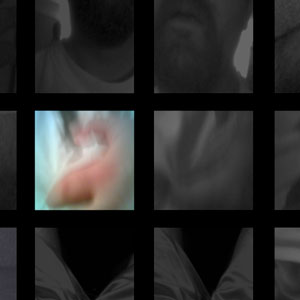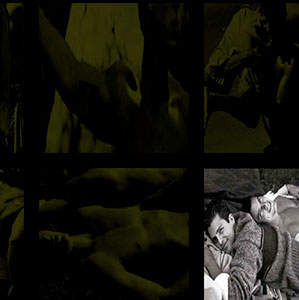"phonesex : a digital collage" and "dis|orientation : a straight closet" explore how we interact with digital media, particularly a Web-based interface, to (re)experience differing senses of embodiment and the complex relationships among bodies, embodiment, and identity. I’m drawn in particular to investigating the circulation of identities and digitized bodies—and to understanding how both get picked up in the Webbed world, are remixed, and then redistributed both to normalize identity trajectories and disturb such normative trajectories.
"phonesex" invites touch that viscerally implicates the interactor in what s/he is touching. At the same time, the piece frustrates users’ expectations because “clicking” on the images and “scrolling down” the page take you nowhere. Instead, I intend the piece to provoke reflection on the act of “touching” images and responding to the presence of potential “links.” What motivates our desire to digitally touch, to pursue linkages—particularly when the shadowed images tease and taunt—and potentially disturb? If you continue to touch, to scroll down, what—after a point—are you really looking for? And what does that say about our desires, and the role of desire in interacting with digital technologies that represent and mediate bodies?
"dis|orientation" probes how we construct online identity and represent bodily desire by linking our haptic expectations as we touch—and push—the fantasy images of advertising to realities of the sexual underground. As with “phonesex,” the lingering mouse touch reveals sexualized images from the advertising world, specifically the overly sexualized images of Abercrombie & Fitch poster boys. But pushing the images takes us to postings inspired by Craigslist advertisements from men who are self-identified as straight but who are seeking man-to-man bodily contact. In this piece, I invite meditation on the nature of the “closet” vis-à-vis multiple identificatory practices and positions. The closet, in this case, is simultaneously the repository of A&F clothing, the perennial favorite of fratboys and straight college kids; the homo-eroticized advertising used to appeal to such kids; the pervasiveness of homo-erotic behavior masked under the label “straight;” and the continued larger cultural failure to honor the homo-erotic while still using it to sell merchandise. Dominant culture constructs the homo-erotic as the secret, tempting desire that must still be hidden behind the façade of the “straight.” I find it curious how the digital world provides access to linking different pieces of our fractured sexual landscape.
Fair Use Statement
All images in "phonesex" were taken by and are owned by the creator. Images in "dis|orientation" fall under fair use as they are remixed from popular media to create artwork as social commentary. Statements were inspired by Craigslist postings so that they reflect the intention but not the specificities of any particular post; all original postings that inspired my “posts” have since expired. The artist makes no material profit from either artwork.

